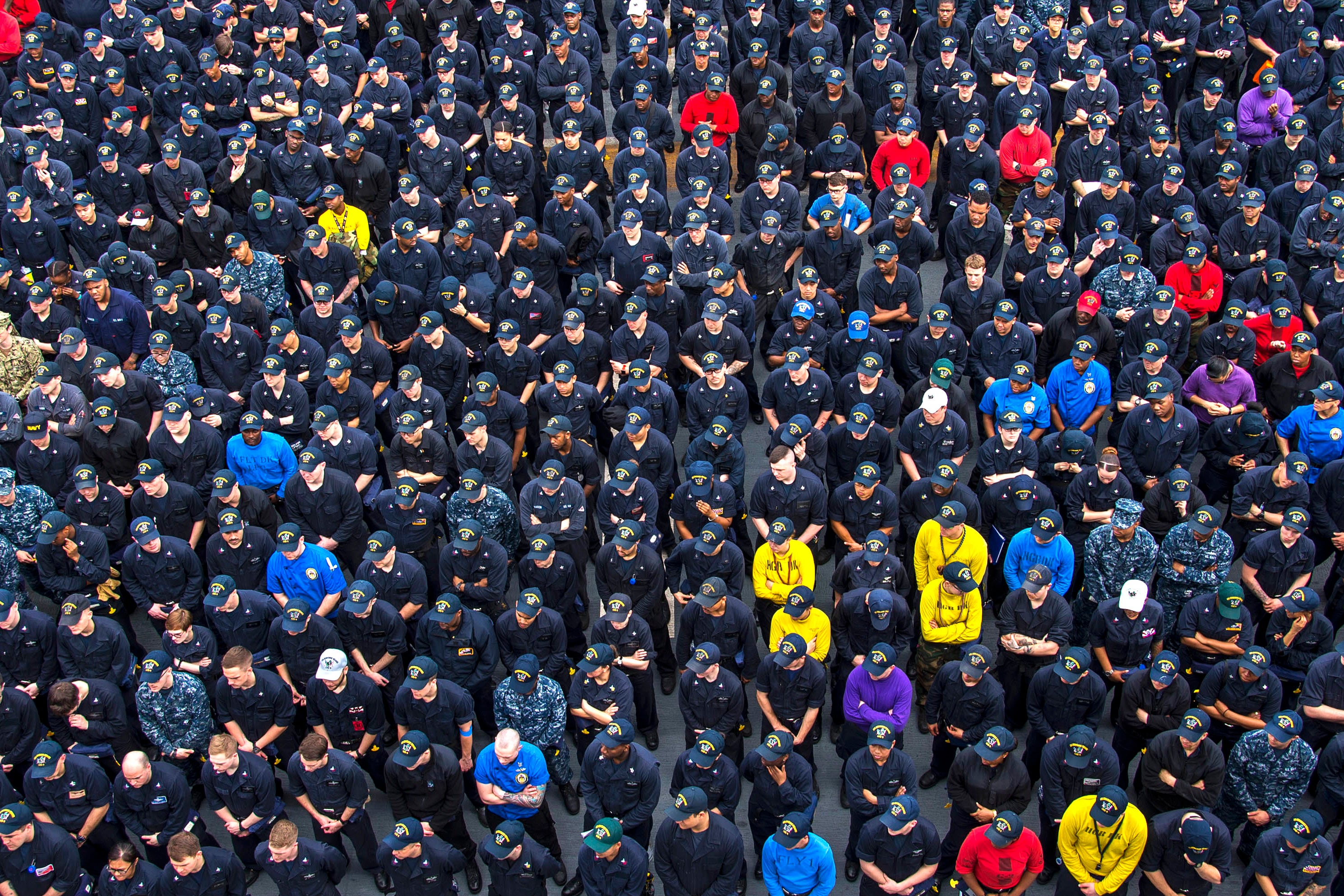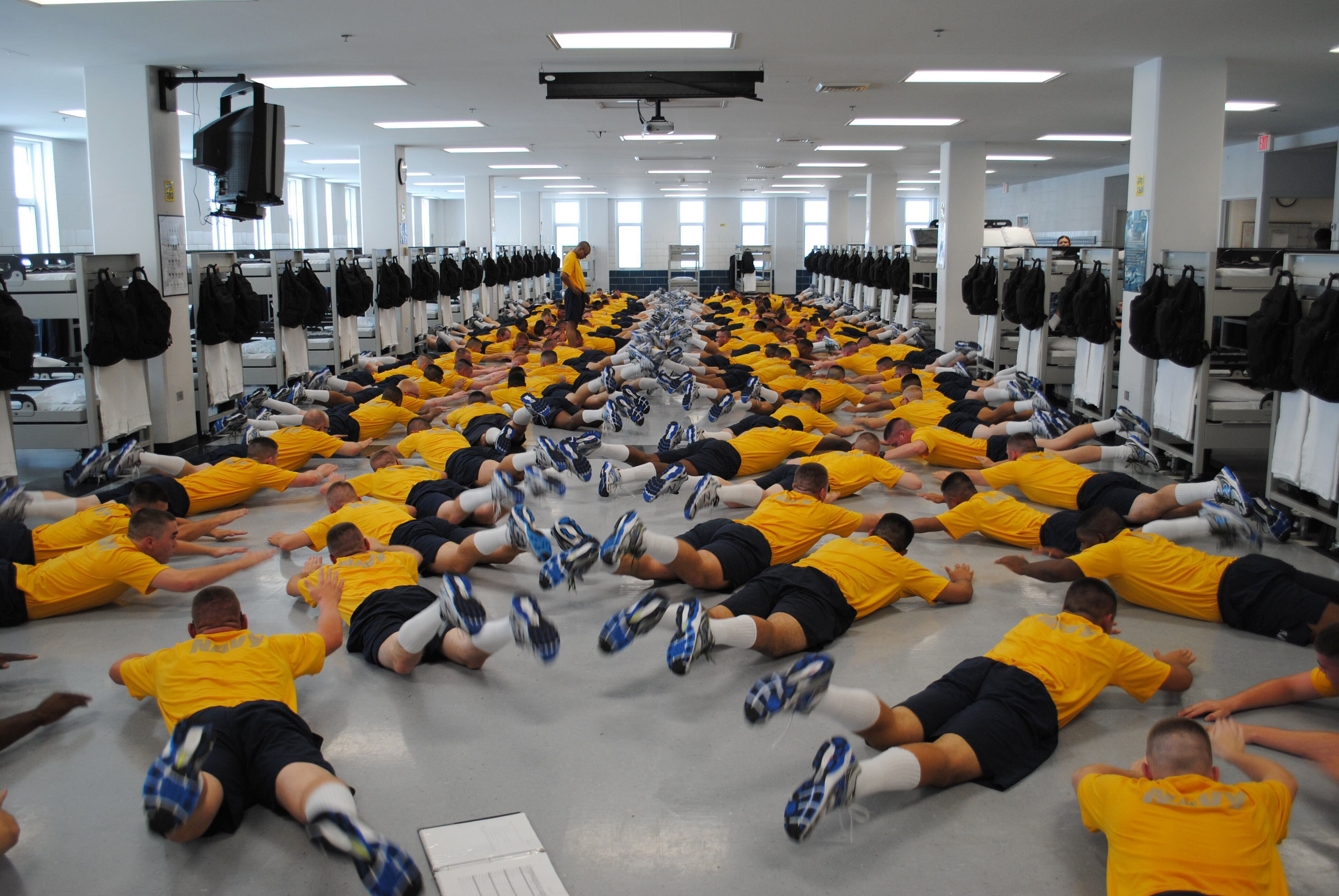The Navy will grant a clean slate to nearly 50,000 sailors with fitness failures in their records, part of new shakeup for fleet-wide fitness rules announced Thursday.
A new Navy-wide message instructs commands to immediately stop discharging sailors for fitness failures and to cancel any pending discharges for sailors slated to be kicked out after March 31. The change applies to both enlisted and officers.
The message also unveils a new set of rules for the Physical Fitness Assessment, bringing to an end the rules forcing sailors to leave the Navy if they failed two fitness assessment tests in a three-year period.
The Navy’s Physical Fitness Assessment, or PFA, is a two-part process consisting of a Body Composition Assessment and a Physical Readiness Test. The test grades sailors, based on their age, on push-ups, sit-ups and a 1.5-mile run.
Other major changes will include making sailors take a body fat test immediately after reporting to a new command and also making sailors who fail the fitness test ineligible for advancement or frocking.
The new PFA rules are part of a broader effort to keep more sailors in uniform at a time when the Navy is trying to increase end strength by over 4,100 by the end of the current fiscal year in September 2018.
“Retention of every capable Sailor is critical to the operational readiness of the Navy,” Vice Adm. Robert P. Burke, the chief of naval personnel wrote.
“The goal of the Navy’s physical readiness program is to maintain a minimum prescribed level of fitness necessary for world-wide deployment and to maintain a sailor’s long-term health and wellness,” Burke said.
The change marks the third time in a week that the Navy has scaled back its rules that send sailors prematurely packing before the end of their enlistment. The Navy has recently increased high-year tenure for E-3 sailors and ended early out programs.
RELATED

For sailors who have failed past PFA tests, the new rules will let them stay in the Navy until at least the end of their current enlistment or service obligation.
If those sailors pass their next PFA test, they will be in good standing and can potentially stay beyond their current enlistment. But if they continue to fail the PFA, they won’t be allowed to stay in beyond their current service obligation, according to the new rules.
Last year, the Navy kicked out nearly 1,700 sailors for failing two PFAs within a three-year period, officials said.
As of July 2017, the end of the last official PFA cycle, more than 43,000 sailors have at least one failure in the past three years; another 5,477 have at least two failures on the books, according to the chief of naval personnel.
The Navy’s says that right now, 36 sailors — five officers and 31 enlisted sailors — have orders in hand separating them for PFA failures. Another roughly 677 — 47 officers and 630 enlisted — are currently being processed for separation based on PFA failures.
This is the second time in two years that the Navy has given PFA amnesty to sailors with failures on the books. The Navy reworked its PFA program in 2015 to ease the body fat percent rules and tighten the failure consequences.
RELATED

Enlisted sailors slated for a premature discharge before March 31 have until Feb. 1 to notify their commands whether they want to stay in. Officers in the same situation must ask Navy Personnel Command to have their separations reversed, which must then be approved by Secretary of the Navy Richard Spencer.
For sailors with enlistments expiring between Jan. 1 and June 30 who are not eligible to reenlist due to bad performance evaluations based on fitness failures, the Navy is giving a one-time pass to extend their enlistments to Sept. 30. These sailors, however, can’t re-enlist or extend further until their records in the fitness database show they’ve passed the spring 2018 PFA cycle.
As part of this new initiative, every sailor’s fitness slate will be wiped clean on Jan. 1, but following the upcoming spring’s testing cycle, a new set of rules be applied to those not meeting fitness standards.
RELATED

A key new requirement is that all sailors transferring to a new command will get a Body Composition Assessment, or BCA, within five days of reporting to a new command. Those who fail will be immediately enrolled in their new command’s Fitness Enhancement Program, or FEP, until they pass an official PFA cycle.
The new policy also dictates that sailors failing a PFA won’t be eligible for advancement or frocking, and will be required to participate in their command’s Fitness Enhancement Program until they pass an official PFA cycle. Those selected for advancement in this status will have any pending advancements held up.
Eligibility for advancement can be reinstated by passing a “command-directed monthly FEP mock PFA,” the new rules state. Sailors will have to stay in the FEP, however, until passing the next official PFA.
The more serious consequences will be reserved for those who fail two consecutive PFAs.
Enlisted sailors who fail two consecutive PFA tests will not be eligible for advancement and will be unable to reenlist or extend as well.
For both officers and enlisted, back-to-back failures will prompt a mandatory fitness evaluation, or a performance evaluation that notes significant problems.
These sailors will remain in their command’s FEP, but there’s no mock PFA test to put them back in good standing. They will have to wait for and pass their next regularly scheduled PFA.
The enlisted sailors who fail consecutive PFAs won’t be discharged until their end of service date, but the policy differs slightly for officers.
Officers could be processed for separation — or retirement if they’re eligible — after two consecutive failures. Officers in this category won’t actually have to leave the service, however, until their next scheduled rotation date. Once again, though, the final decision will be up to the Navy Secretary’s office.
Officers who may face separation can get back in good standing if they pass their next fitness assessment, but their commands will need to submit the proper paperwork to Navy Personnel Command to halt administrative separation.
Mark D. Faram is a former reporter for Navy Times. He was a senior writer covering personnel, cultural and historical issues. A nine-year active duty Navy veteran, Faram served from 1978 to 1987 as a Navy Diver and photographer.





